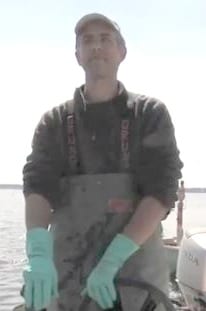
Anthony Bavuso on the water |
Anthony Bavuso began oyster farming on his property in York County, Virginia, because he wanted to be a producer and saw oysters as a way to help improve our food system: a system that he had become frustrated with for its lack of quality.
What Bavuso didn’t know was that this desire to produce quality food would lead to spending the next four years in a court battle with the York County Board of Supervisors (BOS), an experience both the farmer and his wife, Elyse Pyle, have described as “surreal.”
Bavuso’s troubles started when another York County resident, Greg Garrett started up his oyster farm on his own land in 2011, a year after Bavuso had begun farming. Garrett had made enemies with two of the five individuals comprising the BOS, and those two were able to enlist the help of a third BOS member to carry out their political vendetta against Garrett by moving to ban all aquacultural activities in the county. Bavuso was swept up in the BOS’s use of their power of office to end Garrett’s business and had to go to court to save his farm.
Eventually Garrett dissolved his oyster business but all that did was to lead the BOS to substitute Bavuso for Garrett as its main target; Bavuso has had two court victories over the BOS upholding his right to farm on his property but that hasn’t stopped the board’s attempts to shut him down and exhaust his resources in doing so. The BOS’s latest move is its appeal of a favorable verdict for Bavuso by a York County Circuit Court judge’s ruling last summer that the Virginia Right to Farm Act banned the county from requiring Bavuso to obtain a special use permit to farm his land. In speaking about why the county has dragged the family through one process after another, Pyle said, “It’s because they can.”
The following chronology that Bavuso has written best captures what he and his wife have been through.
2010 – We begin operating our oyster farm from our home in Seaford, Virginia. Our property is in the Resource Conservation zone which is the least intense zoning category in the country that permits, by right, the land uses of agriculture and aquaculture (which is aqua farming). Prior to starting up we spoke with county zoning officials who said we could legally operate our oyster business on the property.
Fall of 2011 – The York County Board of Supervisors proposes removing people’s ability to farm their land from all the Resource Conservation (RC) and Rural Residential (RR) zoning districts which make up about 69% of the total acreage in the county.
I inquired how to grandfather my farm. I was told by the Chief of Zoning and Code Enforcement that my farm was permitted by right and to document my use by filling out some forms. Then in an about face, I was told by the zoning administrator that I needed a special use permit to continue my farm.
November 14, 2011 – The York County zoning administrator writes a determination letter stating that the zoning ordinance prohibits a farm and a residence to exist on the same property and that the activity would only be allowed with the granting of a Special Use Permit.
November 16, 2011 – The York County Board of Supervisors considers an ordinance change to remove the use of agriculture from the RR zone and remove both agriculture and aquaculture from the RR and RC zones. For seven hours, 150 citizens filled the meeting hall beyond capacity with 80 speaking against removal of agriculture. The Board decided not to ban agriculture but instead passed an ordinance that changed the definition of agriculture to exclude aquaculture.
April 17, 2012 – We appeal the November 14, 2011 determination letter while at the same time applying for a Special Use permit. I have six adjacent neighbors who wrote letters of support. The permit was recommended for approval by the County Administrator, the County Staff and unanimously voted for approval by the Planning Commission. And despite all of that support, at a Tuesday night monthly board meeting on April 17, 2012, the Board of Supervisors denied the permit by a 3-2 vote. Three people decided to shut down my business after two years of operating with no complaints.
November 6, 2012 – York County Circuit Court overturns the determination letter, stating that no Special Use permit is required. The county appeals the court’s ruling directly to the Virginia Supreme Court which agrees to hear the case
January 2, 2014 – The Virginia Supreme Court overturns the Circuit Court holding the county does require a Special Use permit
January 31, 2014 – I file a Complaint for Declaratory Judgement with the York County Circuit Court asking if the York County zoning ordinances that require a special use permit were legal in light of the Virginia Right to Farm Act.
March 31, 2014 – The Governor of Virginia signs into law HB 1089 which clarifies that counties cannot require special use permits for farming activities such as aquaculture.
April 1, 2014 – The York County Board of Supervisors holds a meeting to consider zoning ordinance proposals that range from an all-out ban of agriculture on 69% of the properties in the county to banning agriculture on about 65% of all properties in the RR and RC districts.
April 4, 2014 – York County files for an injunction with the York County Circuit Court to shut down my oyster farm on the grounds that I don’t have a Special Use permit.
April 28, 2014 – A hearing on pre-trial motions to dismiss the January 31 Right to Farm complaint is held at the York County Circuit Court. In a letter dated May 22, the Circuit Court denied all motions to dismiss and cleared the way for a trial on the merits of the Right to Farm questions.
May 14, 2014 – The first public hearing of the York County Planning Commission is held to discuss the proposed agricultural restrictions. Opponents of the proposal hold a rally with over 100 attending.
The York Planning Commission meets to consider rezoning just the York Point area where I live. They vote 7-0 against rezoning the York Point neighborhood but do pass a resolution creating a new RR33 zoning designation that does not include agriculture. Only six days later the York County Board of Supervisors votes 4-1 to both create the RR33 zoning designation and to rezone the York Point neighborhood to RR33 residential only zones.
July 16, 2014 – I file a complaint for declaratory judgement with the York County Circuit Court alleging the June 17, 2014, rezoning was illegal “spot zoning.”
October 21, 2014 – The York County Board of Supervisors votes to pass zoning ordinance #14-20 adding performance standards for agriculture and aquaculture which drastically reduced (in a range of a 70% reduction) the number of properties in the county on which these activities could occur.
March 12, 2015 – A trial is held at the York County Circuit Court where the judge hears arguments and expert testimony that my operation was a “farm” and that the York County zoning ordinance was in violation of the Virginia Right to Farm Act.
July 14, 2015 – The York county Circuit Court issues a 5-page letter ruling that “the Code of the County of York, in so far as it requires Complainants to obtain an SUP for their oyster farming activities, is in violation of Virginia’s Dillon Rule; that is, the sections of the [County Code]relied upon the County in asserting its right to require the SUP conflict with the state statutes and must be declared void in the circumstances here.”
July 27, 2015 – York County files a motion to reconsider with the York County Circuit Court stating that court was in error in its July 14 ruling and requesting that the court reconsider and change the ruling.
October 13, 2015 – The York County Circuit Court in a letter denies the County’s motion to reconsider the prior ruling.
November 4, 2015 – The York County Circuit Court enters a final order in the Right to Farm complaint which denied the County’s motion to reconsider and found that the York County zoning ordinance in relation to the Bavuso farm was void and in violation of the Code of Virginia.
January 19, 2016 – The York County files a 59-page Petition for Appeal with the Virginia Supreme Court alleging that the York County Circuit Court made eight errors in the court’s ruling finding the County zoning ordinance void and illegal in light of the Virginia Right to Farm Act.
The Bavuso case is about elected officials using taxpayer money to carry out a personal agenda and shutting down a productive member of the community for daring to stand up to them.
The BOS plan to eliminate agriculture and aquaculture in most of the county is an attack on the county’s tradition and its ability to be self-sufficient through local food production. Bavuso deserves support for fighting against it.
The Farm-to-Consumer Legal Defense Fund was formed to protect farmers like Anthony Bavuso and prevent the government from depleting their resources on legal expenses. FTCLDF provided funding for Bavuso’s Supreme Court Case and has also provided funding for expenses in his Right to Farm lawsuit. Fund General Counsel Gary Cox is representing Bavuso in his suit against the county for spot zoning his farm. Gina Schaecher, who is co-counsel in that case, is also representing Bavuso for the BOS’s appeal of the Right to Farm lawsuit.
Further updates on the Bavuso case will be posted on this site as events warrant.
YOUR FUND AT WORK
 Services provided by FTCLDF go beyond providing legal representation for members in court cases.
Services provided by FTCLDF go beyond providing legal representation for members in court cases.
Educational and Political Action Services also provide an avenue for FTCLDF to build grassroots activism to create the most favorable regulatory climate possible. In addition to advising on bill language, FTCLDF supports favorable legislation via action alerts, social media outreach, and the online petition service.
You can help FTCLDF by becoming a member or donating today.

 Anyone wanting to make a contribution to support the work of FTCLDF can make a donation online or send a check to:
Anyone wanting to make a contribution to support the work of FTCLDF can make a donation online or send a check to:
FTCLDF
8116 Arlington Blvd, # 263
Falls Church, VA 22042
Prefer to make a tax-deductible donation? Donate online at bit.ly/NFG4FTC.
You may also contact us by email at [email protected] or call 703-208-FARM (3276). Thanks for your support.